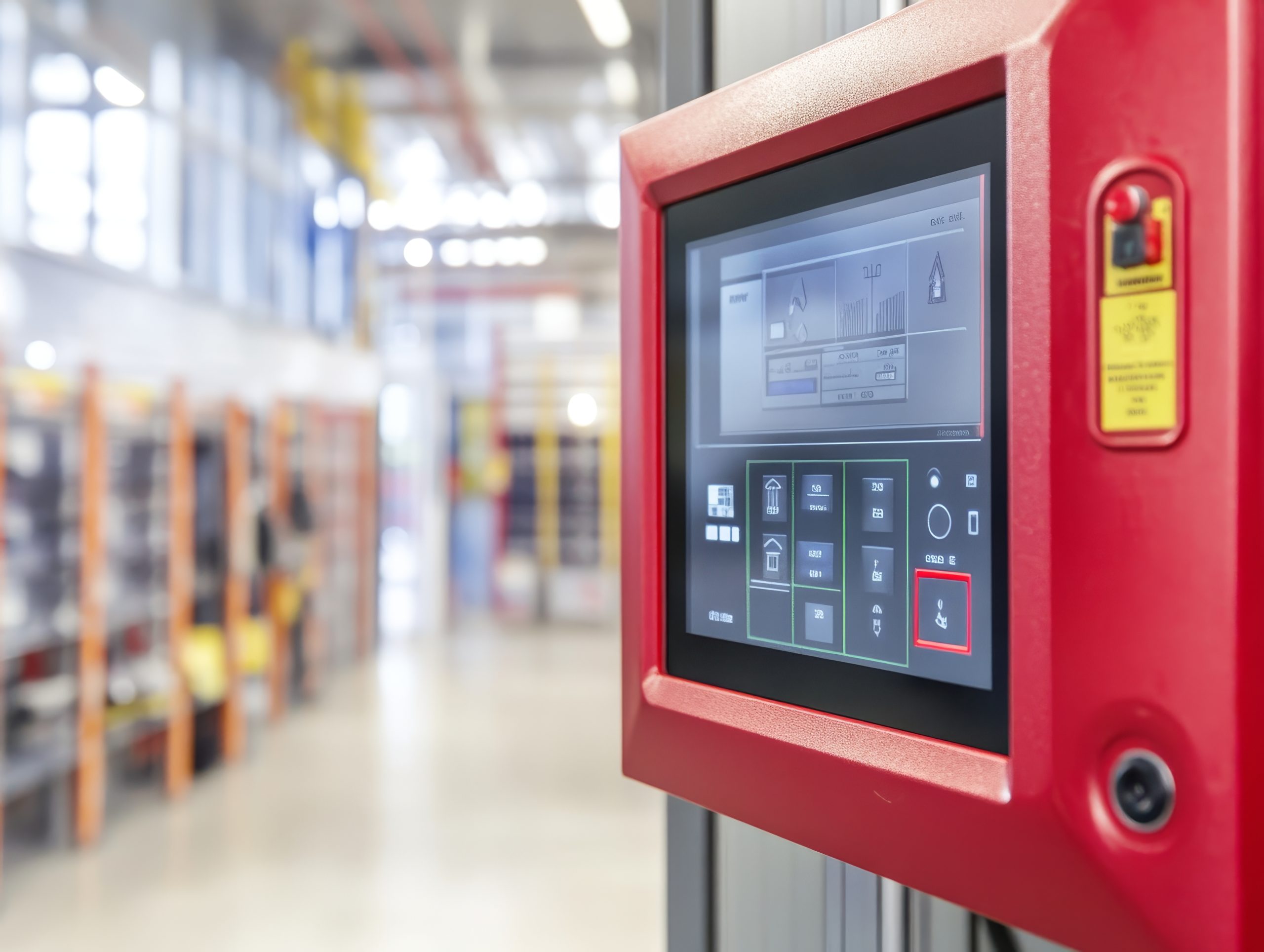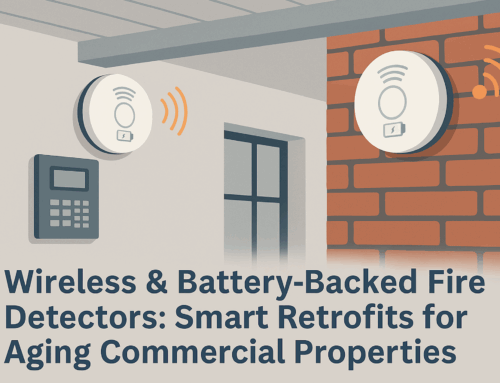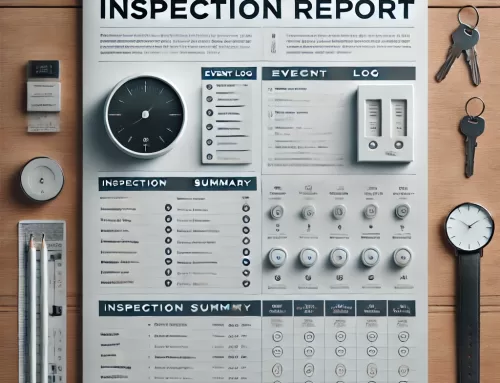While fire alarm systems act as our first line of defense against fire, if not properly monitored, they lack effectiveness. In short, if an alarm goes off when no one is there, it may not trigger an immediate response and you could lose critical time to getting the fire under control. Proper monitoring makes sure that when an alarm goes, emergency responders are instantly contacted.
Learn more about how fire alarm monitoring works to better understand the many ways that alarms integrate with emergency response systems. Choosing 24/7 monitoring can potentially save your business from the costly and devastating damage of fire. Discover these tips on how to choose the right fire alarm monitoring provider for your business.
How Fire Alarm Monitoring Works
Fire alarm monitoring is essentially the direct connection between a business’s fire alarm system and a central monitoring station that can immediately respond in the event of a fire emergency. If the fire alarm in your building is triggered, the central monitoring center receives that alert in real-time. They will then take the necessary steps to send emergency services if required.
Key Components of a Monitored Fire Alarm System:
There are several important components to a monitored fire alarm system, many of which are critical to its effectiveness. Understanding some of these components may help you understand the importance of fire alarm monitoring. Some key components include:
- Fire Alarm Control Panel (FACP) : Think of this as the “brain” of the fire alarm system. It detects signals from smoke detectors, heat sensors, or sprinkler activations.
- Fire alarm panel: The alarm panel sends alerts to the monitoring center through one or more of the following:
- Cellular Network: Wireless transmission that is fast and typically very reliable.
- Radio Frequency: Provides redundancy in the event of phone or internet failures.
- IP (Internet Protocol): Uses an internet connection for instant alerts.
- POTS (Plain Old Telephone Service): Refers to landline transmission, which can be unreliable.
- Monitoring station: The center that receives alerts, verifies the emergency, and contacts the fire department.
- Emergency response dispatch: Fire emergency services are immediately notified which allows for rapid response even if no one is on-site.
Integration with Emergency Response Systems
A monitored fire alarm system does more than just alert a business owner. It also creates a clear and coordinated response among emergency services. This integration is integral for quick response times from emergency personnel.
How the Integration Works
The monitoring center instantly verifies the activation to filter out false alarms before dispatching emergency responders when a fire alarm is triggered. This important process of verification certifies that fire departments are only contacted for real emergencies, which helps to reduce unnecessary disruptions and even false alarm fines.
If you have a building management systems (BMS), fire alarm monitoring can trigger automated protocols. These protocols include actions like shutting down HVAC systems to prevent smoke from spreading or activating fire suppression systems. These integrated actions aid in enhancing fire containment while also minimizing property damage.
Modern fire alarm monitoring platforms also provide businesses with real-time notifications through mobile apps and automated call systems. Business owners and facility managers receive instant alerts about fire-related events, allowing for quick decision-making, even when off-site.
In some cases, fire alarm monitoring is combined with security system integration to offer an additional layer of protection. Remote video verification allows monitoring centers to assess the situation visually, ensuring a more accurate emergency response and reducing the likelihood of false dispatches.
The Financial and Operational Benefits of Fire Alarm Monitoring
In addition to the safety benefits of a monitored fire alarm system, there are also financial and operational perks for business owners. monitoring is a critical component to any building’s fire alarm system. Monitoring is essential, from compliance with local fire codes to reduced downtime in the event of a fire.
- Faster emergency response and potentially reduced fire damage
Early detection and quick response can reduce fire-related losses. Unmonitored fire alarms rely on someone to hear the alarm and contact 911, which causes obvious delays. Monitoring on the other hand offers immediate dispatch, minimizing chances of serious damage to your building.
- Compliance with fire codes and possible insurance requirements
Many jurisdictions require that businesses have monitored fire alarm systems in order to comply with NFPA 72 and other local fire codes. Insurance providers also may often offer lower premiums for buildings with 24/7 fire alarm monitoring.
- Business continuity and reduced downtime
Fires can seriously disrupt operations, which forces businesses to shut down for repairs. A monitored fire alarm system helps contain fire damage early. This allows businesses to resume operations sooner and experience little to no downtime depending on the situation, especially critical for industries like healthcare, manufacturing, and data centers, where downtime can be more costly.
- Liability protection and employee safety
As a business owner, you have a legal duty to provide a safe environment for all building occupants. Fire alarm monitoring reduces the risk of injuries or fatalities by helping to create a rapid evacuation and fire department response, helping mitigate liability in case of fire-related incidents.
- 24/7 protection—even when no one is on-site
Fires don’t always happen during business hours. An unmonitored fire alarm at night or over the weekend may go unnoticed until it’s too late. With monitoring, fire alerts are sent immediately, regardless of whether the building is occupied.
How to Choose a Fire Alarm Monitoring Company
Selecting the right fire alarm monitoring provider is crucial for ensuring reliable, fast emergency response. When choosing a fire alarm monitoring company, consider these key factors:
- UL-Certified monitoring center: Ensure the monitoring provider operates a UL-listed (Underwriters Laboratories) central station. This certification guarantees the facility meets strict reliability, security, and response time standards.
- Redundant communication systems: Look for a provider that offers multiple communication paths (cellular, IP, radio, and landline) to ensure signals are transmitted even if one system fails.
- Fast response times: The effectiveness of a monitoring service depends on how quickly they verify an alarm and dispatch emergency responders. A reputable company should have an average response time of less than 30 seconds.
- Integration with existing fire alarm systems: Your monitoring provider should be able to work with your existing fire alarm panel and provide seamless integration without requiring a full system overhaul.
- 24/7 availability and customer support: Choose a company that provides round-the-clock monitoring and support, ensuring immediate assistance in case of false alarms, system failures, or emergencies.
- Local expertise and fire code knowledge: A fire alarm monitoring company familiar with local fire codes and regulations ensures your business remains compliant and avoids fines or penalties.
Protect Your Business with Fire Systems, Inc.
Fire alarm monitoring is one of the most effective ways to protect your business, employees, and assets. The ability to detect fires in real-time and coordinate immediate emergency response minimizes damage, ensures code compliance, and enhances overall safety.
If you’re looking for a trusted fire protection partner, Fire Systems, Inc. offers industry-leading fire alarm monitoring solutions with UL-certified central station monitoring, advanced communication technologies, and 24/7 emergency response.
Contact Fire Systems, Inc. today at 770-333-7979 or visit our website to learn how we can help secure your business with reliable, code-compliant fire alarm monitoring solutions. Don’t wait for an emergency—protect your business now.







